
SHARE THIS ARTICLE:
2012 Conference Speaker Biographies
 Wim C. Ang, MD, PhD
Wim C. Ang, MD, PhD
Department of Medical Microbiology and Infection Control
VU University Medical Center
P.O. Box 7057
1007 MB, Amsterdam The Netherlands
[email protected]
Serologic tests for Lyme disease – how reliable are they?
Cornelis Willem (Wim) Ang is associate professor of Medical Microbiology and head of the department of Virology & Serology in the VU University Medical Center Amsterdam, the Netherlands.
After earning his M.D. in 1996 (VU University Medical Center Amsterdam, the Netherlands) he did his PhD (Erasmus University, Rotterdam, The Netherlands) on the pathogenesis of the neuroimmunological disease Guillain-Barré syndrome, with a focus on cross-reactive antibodies. Following his PhD, he trained to become a medical microbiologist. His interests are to develop adequate tools for comparing diagnostic assays, including statistical analysis, and to train microbiologists to bring serological diagnosis of infectious diseases to a higher level. In order to accomplish this, he has initiated a training course in infectious diseases serology for residents in medical microbiology.
He has published more than 50 papers across the discipline of medical microbiology. He is editor-in-chief of the Netherlands Journal of Medical Microbiology and also serves in the Dutch working group for Borrelia diagnosis. Dr Ang is involved in numerous projects on validation and quality aspects of serological diagnosis of infectious diseases.
 John Aucott, MD
John Aucott, MD
Instructor in Medicine, Johns Hopkins Hospital
Johns Hopkins University, Baltimore, MD
Private Practice: Board Certified, Internal Medicine
10755 Falls Road, Suite 200
Lutherville, MD, 21093
Office phone: (410) 583-7124
[email protected]
Early Microbiologic and Immunologic Events in Lyme Disease
Dr. Aucott is a graduate of the University of California at Berkeley where he was elected to the membership of Phi Beta Kappa. He attended the Johns Hopkins University School of Medicine, and is a Diplomate of the American Board of Internal Medicine with sub-specialty training in Infectious Disease and Geographic Medicine at University Hospitals of Cleveland. He served as the Section Head for General Internal Medicine and the Residency Program Director at the Cleveland Veterans Affairs Medical Center while on the faculty at Case Western Reserve University School of Medicine from 1989-1996. He was promoted to Associate Professor of Medicine in 1995.
In 1996, Dr. Aucott returned to Baltimore to join the clinical Faculty of Medicine at Johns Hopkins School of Medicine where his focus has been on clinical translation research in Lyme disease. He is currently the Principal Investigator for the prospective cohort study, SLICE, examining the impact of acute Lyme disease on long-term health outcomes and immune function.
Dr. Aucott is the founder of the Lyme Disease Research Foundation, a public non-profit organization founded to promote research and education in Lyme disease. He has lectured through programs sponsored by Johns Hopkins Divisions of Medicine and Infectious Diseases, the American College of Physicians, and other major medical programs in the United States. He has published numerous articles in the field of infectious diseases and Lyme disease.
 Stephen W. Barthold, DVM, PhD
Stephen W. Barthold, DVM, PhD
Department Pathology, Microbiology & Immunology
Center Comparative Medicine/School of Veterinary Medicine
University of California
Davis, CA 95616
[email protected]
Overview of Borrelia burgdorferi in the Mouse: Persistence and Post-Antibiotic Survival?
Stephen W. Barthold, DVM, PhD, Diplomate ACVP, is a Distinguished Professor of Veterinary and Medical Pathology at the University of California Davis, and Director of the UC Davis Center for Comparative Medicine. He received his B.S. and D.V.M. from UC Davis in 1967 and 1969. He served as a Captain in the U.S. Army Veterinary Corps at the U.S. Army Research Institute of Environmental Medicine, Natick, MA from 1969 through 1971, followed by graduate training at the University of Wisconsin, Madison, earning an M.S. and Ph.D. in 1973 and 1974. In 1974, he was appointed Assistant Professor of Comparative Medicine at the Yale School of Medicine, with subsequent promotion to Full Professor in 1989. He went to UC Davis in 1997. Dr. Barthold was elected to the National Academies Institute of Medicine (IOM) in 2001, and is recipient of several career awards, including the AALAS Nathan R. Brewer Award for Career Excellence in Research, UC Alumni Achievement Award, Francis Schofield Medal from the Ontario Veterinary College, Pfizer Research Award, AVMA Charles River Prize, Meriel-AAVMC Excellence in Research Award, and Honorary Diplomate in the ACLAM. His professional specialty is pathology of laboratory rodents and rabbits. He has served on numerous national scientific advisory and review committees, and is past Chairman of the Institute of Laboratory Animal Research (ILAR) Council of the National Research Council. His research has been funded continuously by the NIH for over 35 years, including a primary focus on pathogenesis of Lyme borreliosis for the past 25 years. He has published over 300 peer-reviewed articles, chapters and books.
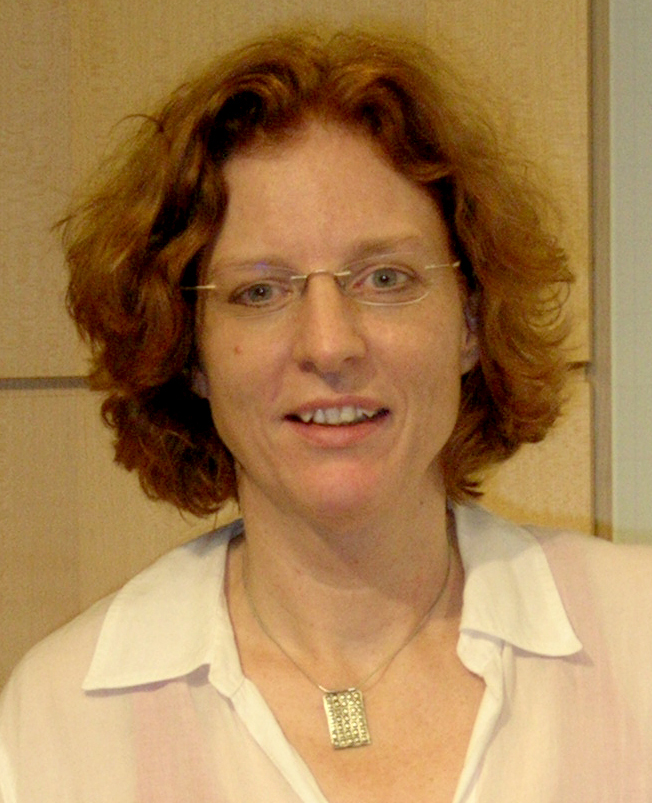 Nicole Baumgarth, DVM, PhD
Nicole Baumgarth, DVM, PhD
Center for Comparative Medicine
University of California, Davis
County Rd 98 & Hutchison Dr.
Davis, CA 95616
[email protected]
B cell subversion during Borrelia infection – a persistence strategy
Nicole Baumgarth is a DVM, PhD and Professor of Immunology at the Center for Comparative Medicine, University of California, Davis. She is also the Chair of the Graduate Group in Immunology there. Dr. Baumgarth’s research encompasses studies on the regulation of immune responses to infections and B cell biology. Much of her recent work has focused on the regulation of B cell responses and B cell subset responses using mouse models to two very different pathogens and immune responses: Acute influenza virus infection, an infection that fully resolves and induces highly protective and long-lived B cell-mediated immunity, and B cell responses to Borrelia burgdorferi, a bacterial spirochete and the causative agent of Lyme disease. Infections with B. burgdorferi induce strong B cell responses, however, those responses to not result in clearance of the infection. By contrasting a successful with a not-successful B cell response her group hopes to uncover important immune regulatory mechanisms that shape the quality of the B cell response.
 Charles Benjamin (Ben) Beard, PhD
Charles Benjamin (Ben) Beard, PhD
Centers for Disease Control & Prevention
3150 Rampart Road – Mailstop P02
Fort Collins, Colorado 80522
Trends in tick-borne diseases in US
Charles Benjamin (Ben) Beard earned a B.S. in 1980 at Auburn University, a M.S. in 1983 at the Louisiana State University School of Medicine, and a Ph.D. in 1987 at the University of Florida. He served as a post-doctoral fellow and associate research scientist at Yale University School of Medicine from 1987 to 1991. In 1991, he joined the Division of Parasitic Diseases at CDC, where he worked on malaria and Chagas disease, and studied the epidemiology of Pneumocystis pneumonia in persons with AIDS. From 1999 to 2003 he served as Chief of the Vector Genetics Section in the Entomology Branch of the Division of Parasitic Diseases before joining CDC’s Division of Vector-borne Infectious Diseases in Fort Collins, CO, in 2003 where he serves as Chief of the Bacterial Diseases Branch and coordinates CDC’s national programs on Lyme disease, plague, tularemia, and Bartonella. His scientific interests include public health and the biology, ecology, and genetics of insect-borne diseases and vectors. More recently he has been involved coordinating CDC’s work in understanding and mitigating the potential impact of climate variability and change on infectious disease ecology and was recently appointed as the Associate Director for Climate Change in CDC’s National Center for Emerging and Zoonotic Infectious Diseases. He has published over 100 scientific papers, books, and book chapters collectively, and has served on a variety of committees and panels both inside and outside of CDC. He is currently an Associate Editor for Emerging Infectious Diseases and past president of the Society for Vector Ecology.
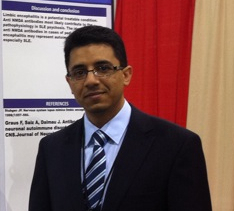 Ibrahim M. Binalsheikh, MD
Ibrahim M. Binalsheikh, MD
Tufts University Dept. of Pediatric Neurology
Floating Hosp. for Children 800 Washington St. Box 330
Boston, MA 02111
[email protected]
Neurologic Lyme disease and Alice in Wonderland syndrome
Following a MD degree in medicine 2000 from Dammam University, Saudi Arabia, I finished 4 years of pediatric residency in the National Guard hospital, Riyadh. I started pediatric neurology residency 2008 in the Floating Hospital for Children at TMC, Boston. Currently I am attending Dr. Eric Frank lab at the Sackler School, Tufts University, Boston. My current research is to study the specificity of sensory nerve regeneration in the spinal cord using H reflex recording. I published:
1.Binalsheikh I, Griesemer D, Wang S, Alvarez-Altalef R. Lyme neuroborreliosis presenting as alice in wonderland syndrome. Pediatr Neurol. 2012 Mar;46 (3):185-6.
2.Binalsheikh I, Wang S “Anti N-methyl-D-aspartate (NMDA) Receptor Limbic Encephalitis presenting as refractory seizure followed by Hashimoto’s thyroiditis and systemic lupus erythematosus : Case Report and Review. Poster presentation.
Child Neurology Soc., 40th annual meeting, Savannah, GA, 2011.
 Diego Cadavid MD
Diego Cadavid MD
Biogen Idec
14 Cambridge Center
Cambridge, Massachusetts 02142
[email protected]
Blood brain barrier & impact of Borrelial infection
Dr. Cadavid received his undergraduate and graduate degree in Medicine and Surgery from Pontificia Universidad Javeriana in Bogotá, Colombia, his post-doctoral training in microbiology and immunology from the University of Texas Health Science Center in San Antonio, Texas, his residency training in clinical neurology from Georgetown University in Washington, DC, and his fellowship in Neuropathology from the Armed Forces Institute of Pathology also in Washington, DC.
After completing his medical education, Dr. Cadavid joined the faculty of UMDNJ-New Jersey Medical School and over a ten-year period worked in clinical practice and basic and clinical research in the field of multiple sclerosis and neuro-inflammation. He was the principal investigator of the BECOME study, the first head to head randomized clinical trial comparing the efficacy by MRI analysis of glatiramer acetate (Copaxone) and interferon beta-1b (Betaferon) for treatment of multiple sclerosis. He has been principal investigator of two NIH and one American Heart Association grants to study inflammatory injury to the blood brain barrier during borrelial infection. He left UMDNJ as Associate Professor in the Tenure track in 2008 to join the Biogen Idec MS Clinical Development Group.
He is currently the Medical Director of the anti LINGO-1 clinical development program that targets CNS repair via remyelination and neuroaxonal protection. He is investigating the efficacy of VLA-4 blockade with natalizumab for treatment of the ambulatory and cognitive impairments of secondary progressive multiple sclerosis. Dr. Cadavid has published over 70 peer-reviewed publications and book chapters on the subjects of CNS infections, multiple sclerosis, and brain pathology. He is a member of the American Academy of Neurology, the American Neurological Association, and the American Society of Microbiology. He is currently Consultant at the Center for Immunology and Inflammatory Diseases at Massachusetts General Hospital in Boston. He is also Adjunct Associate Professor of Neurology and Neuroscience at UMDNJ-New Jersey Medical School.
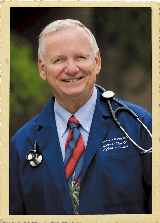 Michael Cichon, MD
Michael Cichon, MD
9804 N. 56th St.
Tampa, FL 33617
[email protected]
Considerations in the diagnosis and treatment of tick-borne diseases
Dr. Michael Cichon is an Internist in Tampa area for the last 37 years. He is Board Certified in Internal medicine and Infectious diseases. He is a member of the Infectious Disease Society of America and International Lyme Association or the ILADS as well as a Fellow of the American College of Physicians. He received his Bachelors of Science at the University of Illinois and Masters in Public Health and Environmental Sciences at the University of Oklahoma. His medical degree is from the Chicago Medical School in 1972. He completed his residence and fellowship at the University of South Florida in Tampa.
He has always maintained a practice of internal medicine and complimented with infectious diseases. He has been involved with the chronic fatigue syndrome and fibromyalgia aliments since its onset and the last 12 years a growing involvement with Lyme Disease and its co-infections has come to the forefront; realizing along the way that probably the cause of chronic fatigue and fibromyalgia is Lyme and its co-infections. Over time, various therapies have evolved based on his large practice and treating Lyme disease and the co-infections.
Dr. Cichon has maintained an affiliation with the University of South Florida throughout his career as a consulting attendant both in Internal Medicine and Infectious Disease in the past and now is a clinical associate professor with medical students rotating through his office. He has a wealth of knowledge and experience as a practicing physician.
 Randi Eikeland, PhD
Randi Eikeland, PhD
Arendal Hospital Department of Neurology
Sørlandet Hospital
Arendal, Norway
[email protected]
Long-term follow up study of neurologic Lyme disease
Current position:
Senior consultant Department of neurology and researcher, Department of Neurology, Sørlandet Hospital, Norway
PhD “long term follow up after neuroborreliosis” 2012
Education: MD (1993) RWTH Aachen, Germany
Specialist in Neurology, Norway: 2002
PhD, University of Bergen, Norway: 2012
Others: 2005-2002 Member of the Norwegian Committee of specialization in neurology.
 Monica E. Embers, PhD
Monica E. Embers, PhD
National Primate Research center Bldg. B, Room 206
18703 Three Rivers Rd. Covington, LA 70433
[email protected]
Post-treatment persistence and sero diagnosis of Lyme disease: studies in rhesus macaques
I received a Bachelor’s of Science degree in 1996 from McPherson College, majoring in Biology and Chemistry. As an undergraduate, I completed two Howard Hughes Medical Institute-sponsored summer research fellowships. In 2003, I received a Ph.D. in Microbiology and Immunology from The Pennsylvania State University College of Medicine. Post-doctoral studies were performed at Penn State and later at the Tulane National Primate Research center.
I am currently a Research Assistant Professor in the Division of Bacteriology and Parasitology at the Tulane National Primate Research Center. My research studies to date have examined immunity and pathogenesis as they relate to both viral and bacterial infections. While my doctoral research focused on immune responses to a viral infection, my current research examines immune evasion strategies of persistent infection by the Lyme disease agent, Borrelia burgdorferi. My experience in microbiology and immunology has involved primate models of bacterial infection including Borrelia burgdorferi, Borrelia turicatae and Moraxella species. Specifically, I have experience with the measurement of immune responses and the detection of organisms in tissues of infected animals. I also have 15 years of experience with rodent models of infection and immunity.
My research program regarding Borrelia burgdorferi and Lyme disease is designed around three foci: (1) antibiotic efficacy against Lyme disease; (2) intradermal immunity and vaccination against infection; and (3) immunodiagnosis for B. burgdorferi infection and cure. The first research goal is to examine the efficacy of antibiotic treatment during disseminated B. burgdorferi infection using xenodiagnosis in the nonhuman primate model of Lyme disease. The second focus is to gain understanding of the skin cell responses by the host to tick saliva and B. burgdorferi during tick feeding, a process that inhibits both wound-healing and inflammation. An adjunct to this work is the use of route-appropriate (intradermal) vaccination against this vector-borne disease to determine the effectiveness of priming the immune response in skin. A third interest is in the development of a quantitative multi-antigen test that expands detection limits and helps to distinguish persistent infection from clinical cure. In addition, I am working with collaborators to develop a primate model of relapsing fever borreliosis.
 Brian A. Fallon, MD, MPH (Course Co-Director)
Brian A. Fallon, MD, MPH (Course Co-Director)
Professor of Psychiatry
Director, Lyme and Tick-Borne Diseases Research Center,
Columbia University Medical Center
Director, Center for the Study of Neuroinflammatory Disorders & Biobehavioral Medicine, New York State Psychiatric Institute
1051 Riverside Drive, Unit 69
New York, NY 10032
Phone: 212-534-6510 for Dr. Fallon & Avi Chandra
Consultations: 212-543-6508
[email protected]
Lyme Disease, Depression, and Suicide
Brian A. Fallon, MD, MPH. Dr. Fallon is director of the Lyme & Tick-borne Diseases Research Center at Columbia University Medical Center where he leads a team focused on biomarkers, diagnostics and treatment of chronic Lyme symptoms. His team’s recent work has included the testing of novel diagnostic assays in a large community study, with the net result of the identification of a more sensitive Lyme Western blot. His team’s work on Lyme encephalopathy led to the discovery of hundreds of unique proteins present in the CSF of Lyme patients but not in the CSF of patients with chronic fatigue syndrome or healthy controls. His team’s current focus is on clarifying the immunologic profile and neural circuitry of patients with persistent symptoms. His team is also investigating the CNS metabolic effects of intravenous ceftriaxone using MR Spectroscopy to probe glutamatergic transmission. Dr. Dwork in his Center is examining the neuropathologic findings in post-mortem studies of patients with chronic Lyme symptoms. Dr. Moeller in his Center is examining the interaction between peripheral immunologic markers, central immune markers, and brain neurocircuitry among patients with chronic symptoms with the goal of identifying of biomarkers to help guide treatment recommendations.
Dr. Fallon serves on the editorial and review board of three journals, has lectured and published widely, and most recently has led an international team for the American Psychiatric Association’s revision of DSM-5 to clarify the prevalence of illness anxiety in the general population.
 Martin Fried, MD
Martin Fried, MD
3200 Sunset Ave, Suite 100
Ocean, New Jersey 07712
www.healthydays.info
Phone 732-682-3425 / Fax 732-455-3309
[email protected]
Nutrition & Lyme disease
Dr Martin Fried, is a pediatric gastroenterologist, a board certified Pediatrician and a Board Certified Physician Nutrition Specialist. He is the founder and former Director of the division of Pediatrics Gastroenterology and Nutrition at Jersey Shore University Medical Center. In the 13 years of practice at Jersey Shore University Medical Center, Dr Fried published 5 original research articles on Lyme disease and coinfections. He has presented his research at numerous Lyme conferences and Pediatric Gastroenterology conferences from 1993 to present. He is a graduate of Upstate Medical University in Syracuse. He did a Pediatric Nutrition Fellowship Training program in Toronto Canada (1989-1991), and was a fellow in Pediatric Gastroenterology and Nutrition at Columbia Presbyterian Medical Center, Babies Hospital in 1991-1992. He is private practice in Ocean New Jersey.
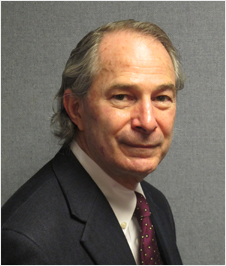 Thomas Greco, MD
Thomas Greco, MD
St Mary’s Hospital
133 Scovill St. – Suite 306 Waterbury, CT 6706
[email protected]
Antiphospholipid antibodies in patients with purported chronic Lyme disease
Dr. Thomas Greco graduated from Georgetown University cum laude and earned his medical degree from Georgetown University School of Medicine. He completed his internship and residency in internal medicine, and fellowship in rheumatology, infectious disease, and allergy and immunology at Yale School of Medicine. He is board certified in internal medicine and rheumatology. He has been at Saint Mary’s Hospital n Waterbury, Connecticut for 35 years and serves as Chief, Section of Inflammatory diseases. An Associate Clinical Professor of medicine at Yale, he teaches residents and medical students at Saint Mary’s Hospital and continues to do clinical research on many illnesses related to aPL.
He has published numerous articles on topics which include testing for the antiphospholipid antibodies in the antiphospholipid syndrome, along with their associations in various disease processes including coronary artery disease, multiple sclerosis, muscle disorders, skin disorders, and most recently Lyme disease among other illnesses.
Dr. Greco has spent the past twenty years researching and treating many patients who have antiphospholipid antibodies – noting, “these blood factors may provide answers for many patients with undiagnosed symptoms and illnesses.”
 Linden Hu, MD
Linden Hu, MD
Tufts Medical Center
Division of Geomed/ID, Box 41
800 Washington St. Boston, MA 02111
[email protected]
Reservoir targeted vaccines for control of Lyme disease
Dr. Linden Hu is Professor of Medicine at Tufts University School of Medicine and Vice Chairman for Faculty Development in the Dept. of Medicine at Tufts Medical Center. He received his A.B. in Human Biology and M.D. from Brown University. He did his residency in Internal Medicine at St. Elizabeth’s Medical Center in Boston and a fellowship in Infectious Diseases at Tufts Medical Center.
Dr. Hu is involved in both clinical and laboratory based research into Lyme disease. His focus is on the mechanisms by which the spirochete adapts to its various natural hosts and evades the host immune responses. His laboratory is also developing reservoir-targeted vaccines to reduce transmission of tick borne diseases in the wild.
Dr. Hu has been a member or Chairman of numerous peer review committees for the NIH and the National Research Fund for Tick-borne Diseases. He has received a Daland Fellowship from the American Philosophical Society and the Maxwell Finland Award from the Massachusetts Infectious Disease Society and is a Fellow of the Infectious Disease Society of America. In 2010, he was elected to the American Society for Clinical Investigation. Dr. Hu teaches at Tufts Medical School and at the Sackler School of Graduate Biomedical Studies where he is training faculty in the Programs in Microbiology and in Immunology.
 Kim Lewis
Kim Lewis
Northeastern University
306C Mugar Life Sciences
360 Huntington Avenue Boston, MA 02115
[email protected]
Antibiotic tolerance & microbial persistence
Kim Lewis is a University Distinguished Professor and Director, Antimicrobial Discovery Center at Northeastern University in Boston, and a Fellow of the American Society of Microbiology.
He obtained his Ph.D. in Biochemistry from Moscow University in 1980, and has been on the Faculty of MIT, University of Maryland, and Tufts University prior to coming to Northeastern.
Dr. Lewis has authored over 100 papers and is an inventor on several patents. His more notable findings include the discovery of synergistically-acting antimicrobials in medicinal plants [1,2]; a general method to grow previously “unculturable” bacteria that make up >99% of biodiversity on the planet [3,4], the invention of sterile surface materials [5]; the development of high-throughput screening for antimicrobials in a live infected animal (C. elegans) [6]; and the discovery of the culprit of recalcitrant biofilm infections, drug-tolerant persister cells [7,8,9,10,11].
Dr. Lewis presented over 80 invited lectures. Dr. Lewis has been a permanent member of the Drug Discovery and Drug Resistance NIH Study Section, and Chair of two NIH Study Sections on Drug Discovery. Dr. Lewis has served as a panelist and contributor to the National Academies Institute of Medicine reports on antibiotic resistance in 2010 and 2011. Dr. Lewis is a member of Faculty 1000, a world-wide panel of experts evaluating research advancements. He is a recipient of the MIT C.E. Reed Faculty Initiative Award for an innovative research project (1992), and is a recipient of the NIH Director’s Transformative Award (2009).
Dr. Lewis has been funded by the NSF, DOE, NIH, ARO, and the Bill and Melinda Gates Foundation. Apart from his work in Academia, Dr. Lewis has served as a consultant to the Pharmaceutical Industry, The Biotech, and is a founder of two Biotech Companies, NovoBiotic Pharmaceuticals, and Arietis Corporation and serves as a member of the Scientific Advisory Board of Seres.
 Emmanuel Mongodin, PhD
Emmanuel Mongodin, PhD
Institute for Genome Sciences
University of Maryland BioPark II
801 West Baltimore Street, Office #622 Baltimore, MD 21201
[email protected]
Genome stability of Lyme disease spirochetes
Originally trained as a physiologist, I am a microbiologist with a kin interest in research focused on the application of microbial genomics and comparative genomics approaches to the study of host-pathogen interactions, as well as the microbial populations colonizing the human body. During my Ph.D. work at the university of Reims-Champagne-Ardenne (France), I investigated the adherence mechanisms of Staphylococcus aureus to human respiratory epithelial cells. The results of my doctoral research project shed light into the mechanisms involved into the adherence of opportunistic bacterial pathogens, such as S. aureus but also Pseudomonas aeruginosa, to the human respiratory tract, as well as the bacterial virulence factors involved in the invasion and colonization of the human airways.
Following my doctoral work, I started my postdoctoral training in the laboratory of Dr. Gordon Archer (Chair, Infectious Diseases Department, VCU, Richmond, VA), one the world’s leading expert in the S. aureus and S. epidermidis research. In his lab, I researched the mechanisms of acquisition of antibiotic resistance by these two organisms. S. aureus is the most common cause of hospital- and community-acquired infections, and can cause a range of illnesses from minor skin infections to life-threatening diseases, such as pneumonia, endocarditis, toxic shock syndrome and septicemia. S. aureus has become resistant to the most commonly used antibiotics, rendering any antibiotic treatment following an infection by this organism completely ineffective. During my post-doctoral training I became a visiting scientist at The Institute for Genomic Research (TIGR, Rockville, Maryland) and collaborated with Dr. Steven Gill on the sequencing, annotation and analysis of the genomes of S. aureus strain COL and S. epidermidis strain RP62A (Gill et al. 2005). The work on these two genomes allowed me to acquire the knowledge base of microbial genome sequencing, which I then applied to various microbial genome-sequencing projects after I became a staff scientist first at TIGR and later at the J. Craig Venter Institute. Most importantly, this work on the COL and RP62A genomes laid the foundation for post-genomic functional characterization on these two organisms. In collaboration with Dr. Gill, I developed microarray tools to explore the transcriptional profiles of these bacteria during the acquisition of antibiotic (oxacillin and vancomycin) resistance in Staphylococci.
Following my postdoctoral training with Dr Archer, I became a Staff Scientist in Dr. Karen Nelson’s lab at The Institute for Genomic Research, now the J. Craig Venter Institute (JCVI). At JCVI, I played a major role in the management of various microbial genome-sequencing projects, such as Arthrobacter aurescens (a soil bacterium that can consume and break down environmental pollutants), Salinibacter ruber (the only known bacterium that thrives in environments with very high concentrations of salt), various strains of Campylobacter species (a major cause of human bacterial gastroenteritis), outbreak strains of Listeria monocytogenes (bacteria associated with food-borne illness outbreaks), as well as 17 strain representatives of the major Borrelia species causing Lyme disease: Borrelia burgdorferi, Borrelia afzelii, Borrelia garinii and Borrelia valaisiana.
In 2007, I joined as an Assistant Professor the Department of Microbiology and Immunology at the University of Maryland School of Medicine (SOM) and the Institute for Genome Sciences (IGS), where I focused my research on the human microbiome using metagenomic approaches. In complex environments where most species are not cultivable, characterization of the microbial species present and of the functions they perform can be achieved through metagenomics approaches, without the need for isolation and lab cultivation of individual species. Some of the metagenomic projects I am currently involved in are focused on the microbial communities inhabiting the human gut, and the impact they have on diseases such as obesity and Crohn’s disease. Other projects include the characterization of the microbial communities inhabiting the oral cavity of healthy subjects and in subjects with periodontal and endodontic diseases, and the microbiome associated with S. aureus colonization in the anterior nares.
 Steven J. Norris, PhD
Steven J. Norris, PhD
University of Texas-Houston Medical School
6431 Fannin Street, MSB 2.120 Houston, Texas 77030
[email protected]
How do Lyme disease Borrelia cause disease?
Steven J. Norris, Ph.D. received a bachelor’s degree in Psychobiology at UCLA, then gradually evolved toward microbiology while obtaining an M.S. in Biochemistry and Molecular Biology at UC Santa Barbara, a Ph.D. in Microbiology and Immunology at UCLA in 1980, and postdoctoral training at UC San Diego. Most of his career has focused on understanding host-pathogen interactions of invasive bacteria. Dr. Norris began his faculty career at the University of Texas Medical School at Houston in 1982 and continued studies on the physiology and in vitro culture of Treponema pallidum, the spirochete that causes syphilis. His work expanded into molecular genetics with participation in the sequencing and annotation of the T. pallidum and T. denticola genomes. Studies on the pathogenesis of Borrelia burgdorferi, the Lyme disease agent, resulted in the discovery and characterization of the vls locus (an elaborate antigenic variation system) in 1996. In 2007, Dr. Norris received the University of Texas Chancellor’s Entrepreneurship and Innovation Award for the development of a new immunodiagnostic test for Lyme disease using the protein VlsE. Recent work has focused on the implementation of genetic approaches for the identification of additional virulence determinants and important immunogens in Lyme disease and syphilis spirochetes. His group is currently screening a transposon insertion library in B. burgdorferi in an attempt to identify every gene important in Lyme disease pathogenesis. With Dr. Jun Liu and other collaborators, Dr. Norris is also examining spirochetal structure using cryoelectron tomography and additional techniques.
Dr. Norris is a Fellow of the American Academy of Microbiology, and has served as the chair of the American Society for Microbiology Division of General Medical Microbiology and of the Gordon Research Conference on the Biology of Spirochetes. Leadership roles in the UT Health Science Center at Houston include President of the Faculty of the Graduate School of Biomedical Sciences, Chair of the Faculty Senate of the Medical School, and Chair of the Curriculum Committees for both the Graduate School and the Medical School. Service to the scientific community is exemplified by regular membership on NIH grant review panels and editorial board positions for the journals Infection and Immunity and Molecular Microbiology. Dr. Norris also received the Faculty Mentor of the Year in 2000 for his role in fostering the development of faculty in the Medical School. He is currently the Robert Greer Professor in Biomedical Sciences and Vice Chair of Pathology and Laboratory Medicine at the University of Texas Medical School at Houston. A more detailed description of Dr. Norris’ research and links to recent references can be found at https://www.uth.tmc.edu/pathology/faculty/faculty-norris-steven.html.
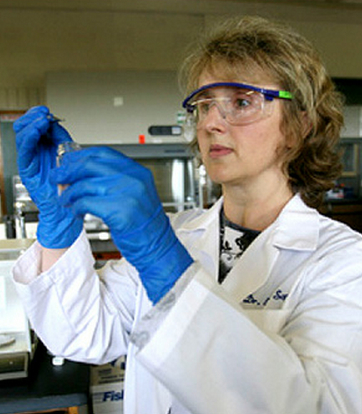 Eva Sapi, PhD
Eva Sapi, PhD
Associate Professor and University Research Scholar
Director of the Lyme Disease Research Program
Department of Biology and Environmental Science
University of New Haven
300 Boston Post Road GH 104A
West Haven, CT 06510
Phone: (203) 479-4552
[email protected]
In Vitro antimicrobial sensitivity studies
Dr. Sapi received her PhD degree in Genetics from the University of Eotvos Lorand (Budapest Hungary). She had her postdoctoral training at Yale University where she studied the effects of different hormonal factors on the development of breast and ovarian cancer. She currently is an Associate Professor at the University of New Haven where she teaches graduate biology courses and carries out Lyme disease research with her graduate students. Her research team was established 8 years ago and to date, over 60 graduate students have received training in Lyme disease related research.
In the last several years UNH Lyme disease research group has identified an alarming increase in the co-infection rate in deer ticks, including discovery of novel co-infections such as mycoplasma and microfilarial nematode species. In the last 3 years the Lyme research group has received several extramural grant supports from the Turn the Corner Foundation, Lyme Disease Association and Californian Lyme Disease Association which will allow the group to investigate novel ideas for Lyme disease research.
Recently her research group studies the different forms of Borrelia burgdorferi bacteria to better understand how Borrelia can hide from the immune system and from different therapies. With collaboration with Dr. Alan MacDonald, the research group discovered that Borrelia burgdorferi is capable forming a protective layer around itself – called biofilm – which could render it to be very resistant to antibiotics and provide a logical explanation as to why extensive antibiotic treatment for patients with a tick-bite history could fail. The goal of her research group is to identify novel antibacterial agents that are effective in killing all forms (spirochete, round bodies and biofilm) of Borrelia burgdorferi.
Dr. Sapi organized and chaired four National Lyme Disease Symposiums at the University of New Haven during the last several years (2006-2011).
 Alireza Abdollah Shamshirsaz, MD
Alireza Abdollah Shamshirsaz, MD
Department of Obstetrics and Gynecology University of Connecticut Health Center 263 Farmington Avenue
Farmington , CT
[email protected]
Tick-borne diseases and pregnancy
Alireza Abdollah Shamshirsaz, MD from the Department of Obstetrics and Gynecology at the University of Connecticut Health Center
Medical Licensure:
2010-Present: State License, Connecticut #049189.
Jun 2009: Passed Written Examination of “American Board of Obstetrics and Gynecology”, Active candidate
Mar 2005: Educational Commission for Foreign Medical Graduates (ECFMG) Certified
August 2001: Permanent Medical License, Iran.
Peer Reviewer:
Journal of Gynecologic Oncology
Ultrasound in Obstetrics and Gynecology
American Journal of Kidney disease
British journal of Haematology
Journal of Medicine and Medical Sciences
Iranian Journal of Pediatrics
OMICS Publishing group
Current Projects:
Early prediction of fetal complications in monochorionic diamniotic twin pregnancies with ultrasound examination.
Periventricular leukomalacia and placental histopathologic abnormalities.
Maternal weight gain in twin pregnancies and its outcomes.
Fetal echocardiography in the Greater Hartford area 2001-2010; indications, outcome and influence of nuchal translucency.
Improving fetal Down syndrome risk assessment using the first trimester combined test and second trimester sonography.
Genital Mycoplasmas and Neonates outcomes.
 Janis J. Weis, PhD
Janis J. Weis, PhD
Professor of Pathology
University of Utah
15 North Medical Drive #2100
Salt Lake City, UT 84112-5650
[email protected]
Mouse model of chronic inflammatory response to B. burgdorferi
Janis J. Weis, Ph.D., is Professor of Pathology, Division of Microbiology and Immunology at the University of Utah School of Medicine in Salt Lake City. Dr. Weis received the Ph.D. in Microbiology from the University of Minnesota, followed by post-doctoral training in Immunology at Brigham and Women’s Hospital/Harvard Medical School. She was selected as a Biomedical Scholar of the Lucille P. Markey Charitable Trust in 1985. Dr. Weis became an Assistant Professor in the Department of Pathology at the University of Utah in 1988, attaining the rank of Full Professor in 1999. Dr. Weis maintains an active research laboratory at the University of Utah studying the mechanism and genetic regulation of Lyme arthritis development. She is also actively involved in graduate student education and serves as director of the Training Program in Microbial Pathogenesis, an NIH sponsored training grant that supports pre-doctoral and postdoctoral trainees in this discipline. Dr. Weis has served on numerous grant review panels and advisory boards including the Board of Scientific Counselors for the National Institutes of Allergy and Infectious Diseases, Study Sections of the National Institutes of Health, the Centers for Disease Control, the Howard Hughes Medical Institution Research Training Fellowships committee, the Arthritis Foundation Inflammation Study Section, the National Research Fund for Tick-Borne Diseases, the Lyme Center Scientific Advisory Board, the Gordon Research Conference Council. Dr. Weis has maintained an active research program in the host-pathogen interactions associated with Borrelia burgdorferi infection and the pathogenesis of Lyme arthritis. This work has been supported by the National Institutes of Health since 1993. Her current studies are focused on understanding the inflammatory dysregulation associated with acute and chronic Lyme arthritis in mice. Recent studies have identified in B. burgdorferi-infected IL-10 deficient mice several key features that are similar to features seen in patients with Post Treatment Lyme Disease Syndrome. This suggests that the IL-10 deficient mouse may provide a model to study the sustained inflammatory response to B. burgdorferi and gain insight into its underlying cause.
Sonderegger FL, Ma Y, Maylor-Hagan H, Brewster J, Huang X, Gerald J. Spangrude GJ, Zachary JF, Weis JH, Weis JJ. Localized Production of IL-10 Suppresses Early Inflammatory Cell Infiltration and Subsequent Development of IFN-g-Mediated Lyme Arthritis, 2012. J Immunol 188: 1381-1393.
 Ronald A. Hamlen, PhD
Ronald A. Hamlen, PhD
9 Locharron Drive
Elkton, Maryland
[email protected]
Poster Presentation: Prevention of Tick-Borne Infections: A focus on school-aged children.
Ron Hamlen received a PhD in Plant Pathology and Nematology and postdoctoral training in Insect Pathology and Microbial Insect Control from the Pennsylvania State University. Dr. Hamlen also received a certificate in Health Risk Assessment from the Harvard School of Public Health. Dr. Hamlen is currently Vice President and Science Advisor for the Lyme Disease Association of Southeastern Pennsylvania, and a member of the International Lyme and Associated Diseases Society, and he has served as a member of the Delaware Task Force to Examine the Prevalence of Lyme Disease in Delaware. Formerly a Biology Research Fellow and Global Technical Product Manager for E. I. DuPont de Nemours and Co., Inc. and an Associate Professor of Entomology and Nematology with the University of Florida. Dr. Hamlen, now retired, conducts public, corporate, and state government seminars on Lyme disease and related tick-borne infections. Dr. Hamlen has published research and review articles on Lyme disease, related tick-borne infections & their prevention.
Karen Lazarus (Saturday) [email protected]
Andrea Lefever (Sunday) [email protected]
West Chester Co.DOH 601 Westtown Rd. West Chester, PA 19380
Poster Presentation: The Localized Prevalence and Impact of Lyme Disease in Chester County, PA
Karen Lazarus is a Master’s candidate from Drexel University School of Public Health concentrating in environmental & occupational health. She has spent this past summer researching the prevalence and impact of Lyme disease with the Chester Co. Health Dept. She received her Bachelor’s from Temple in 2010 in communications and urban planning and hopes to continue researching human interactions with the built and natural environments.
Andrea LeFever, Public Health Educator, Chronic Disease and Injury Prevention Division, Chester County (PA) Health Dept. works in numerous public health program areas such as Lyme disease, tobacco education, cardiovascular disease, & nutrition. She holds a Master’s Degree in Public Health – Community Health and Bachelor’s Degree in Business Management from West Chester University, PA
Patricia V. Smith
President, Lyme Disease Association, Inc. (LDA)
PO Box 1438 Jackson, NJ 08527
[email protected]
Conference Organizer
Patricia V. Smith, a Monmouth University graduate, has entered her 16th year as President of the all-volunteer national non-profit Lyme Disease Association. A member of Columbia University’s Lyme & Tick-Borne Diseases Research Center Advisory Committee, member of the Environmental Protection Agency’s (EPA) PESP Partnership to promote avoidance of tick exposure, and Advisor to Lyme Research Alliance, CT, she is also former Chair of the (NJ) Governor’s Lyme Disease Advisory Council, former President/12-year member of the Wall NJ Board of Education and was FDA’s 2011 Lyme prevention conference session co-chair with CDC. In 2011 she presented a Lyme session to the New Jersey Education Association’s Annual Meeting. Ms. Smith, a 27+ year Lyme advocate, has raised funds for researchers nationally─research acknowledged in 25 scientific journals.
Besides speaking, publishing, TV/radio appearances and organizing 13 CME accredited Lyme scientific conferences for doctors, she’s testified for and secured passage of state and federal bills for Lyme research and physician’s right to treat. Working with author Amy Tan, she created LDA’s LymeAid 4 Kids, a fund for children with no health coverage for Lyme.
Chosen Jackson NJ’s Chamber of Commerce 2008 Woman of the Year, she has also received a certificate of Special Congressional Recognition from RI Congressman James Langevin, and had a flag flown over the US Capitol by request of NJ Congressman Christopher Smith in honor of her work on Lyme. In 2012, she was an invited to testify before the Foreign Affairs Committee, Africa, Global Health & Human Rights Subcommittee in Washington, DC.





